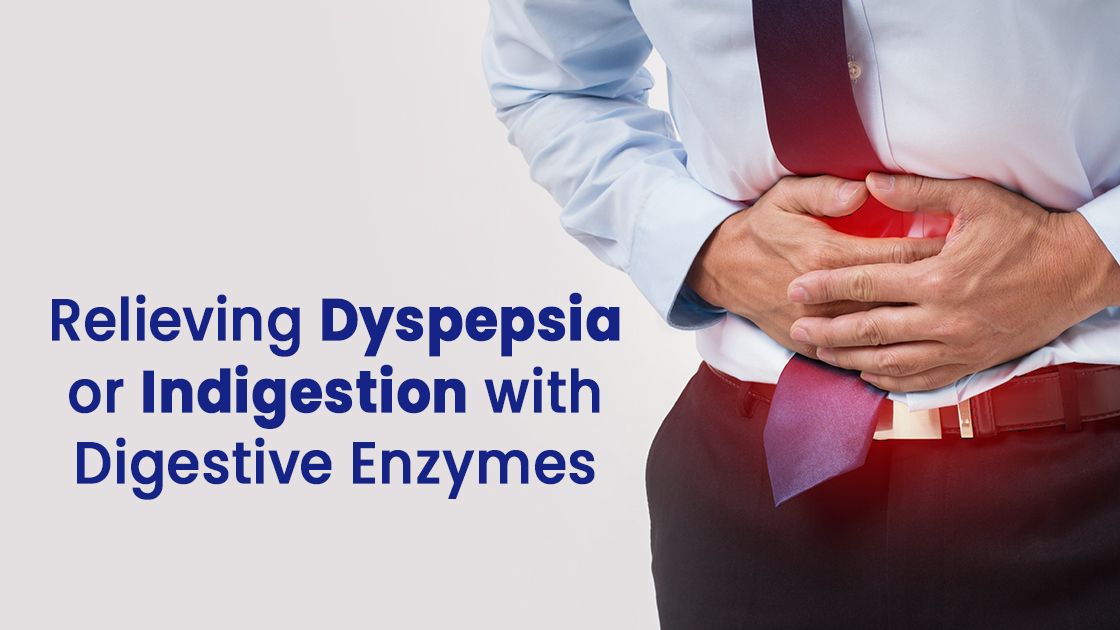Relieving Dyspepsia or Indigestion with Digestive Enzymes
Dyspepsia, also known as indigestion, difficult digestion or upset stomach, refers to a group of troublesome abdominal symptoms such as pain or discomfort in the stomach or chest, bloating or abdominal fullness, flatulence, and belching which is affecting most populations around the globe.
These disturbing symptoms, which are often experienced during or after eating, may vary in intensity and frequency. Symptoms of indigestion are often triggered by consuming certain foods such as fatty or spicy foods, beverages like caffeine, alcohol, soft-drinks and carbonated beverages, overeating, smoking, anxiety, as well as intake of certain medications such as antibiotics, anti- inflammatory drugs and iron supplements.
75% of Cases of Dyspepsia are Considered Functional Dyspepsia
Symptoms felt by the remaining 25% of cases of dyspepsia may be due to an underlying peptic ulcer, acid reflux, infections, hepatitis, gallstone, inflammation of the pancreas, intestinal obstruction, or stomach cancer and would require appropriate and urgent medical care.
On the other hand, majority of cases of dyspepsia have no clear identifiable cause and may be considered as functional dyspepsia. Functional dyspepsia encompasses a group of symptoms of persistent or recurrent upper abdominal pain, discomfort, bloating, and belching in the absence of organic or structural disease that can likely explain the symptoms.
One mechanism offered to explain the occurrence of functional dyspepsia is the deficiency of digestive enzymes. This is supported by a study done in Osaka City University Graduate School of Medicine in 2017 which found that approximately 70% of patients with treatment resistant functional dyspepsia had deficiencies in digestive enzymes.
In a review published by the International Journal of Basic & Clinical Pharmacology, digestive enzyme deficiency was described to either be an actual deficiency due to organic causes such as abdominal diseases, gastrointestinal surgery, and nutritional deficiency, or a relative deficiency due to poor eating habits such as “eating on the run” or eating late in the day and inadequate chewing of food.
The production of digestive enzyme may also be lowered among aging individuals with a linear decreasing trend reported after the fourth decade of life. Excessive consumption of fat and alcohol and high meat intake may also result in enzyme deficiency.
Dealing with Dyspepsia Mainly Involves Treatment of the Underlying Cause
Management of symptoms through medications such as antacids, prokinetics, acid suppressants, antibiotics for infection, and antidepressants to ease discomfort and pain could become a tricky exercise as the symptoms tend to recur and intake of some drugs brings unpleasant side effects.
To ease dyspepsia, patients are often advised to practice lifestyle changes that includes eliminating stress, getting enough sleep, avoiding smoking, and exercising regularly.
Eating the right food, the right way is also central in the control of dyspepsia. Patients must remember to eat less fatty and spicy food, avoid alcohol, soft-drinks and coffee. Chewing the food gradually or slowly helps to avoid gas to enter the stomach.
Supplementation with oral digestive enzymes is also a commonly employed approach for functional dyspepsia. Oral preparations of enzyme supplementsprovide various digestive enzymes that aid in breaking down or digesting the food nutrients, carbohydrates, fats and proteins, to smaller particles that can be absorbed by the body. Symptoms of dyspepsia are relieved by oral enzyme supplementation through their action of aiding the digestive process. Supplementation of digestive enzymes in functional dyspepsia has been clinically shown to significantly reduce the symptoms of flatulence, bloating, belching, and distress after meals.
Digestive enzyme preparations, according to the review, enhance digestive power, help in the complete absorption of nutrients, and support the body’s natural metabolism. Preparations of digestive enzymes do not interfere with internal metabolism and are well tolerated with minimum side effects.
Patients who are bothered by nagging or recurring symptoms of dyspepsia, should consult their doctors for appropriate medical evaluation and management.
References:
Bytzer P, Talley NJ. Dyspepsia. Ann Intern Med.
Aziz I, Palsson OS, Törnblom H, Sperber AD, Whitehead WE, Simrén M. Epidemiology, clinical characteristics, and associations for symptom-based Rome IV functional dyspepsia in adults in the USA, Canada, and the UK: a cross-sectional population-based study. Lancet Gastroenterol Hepatol.
Fujikawa Y, Tominaga K, Tanaka F, et al. Postprandial Symptoms Felt at the Lower Part of the Epigastrium and a Possible Association of Pancreatic Exocrine Dysfunction with the Pathogenesis of Functional Dyspepsia. Intern Med.


